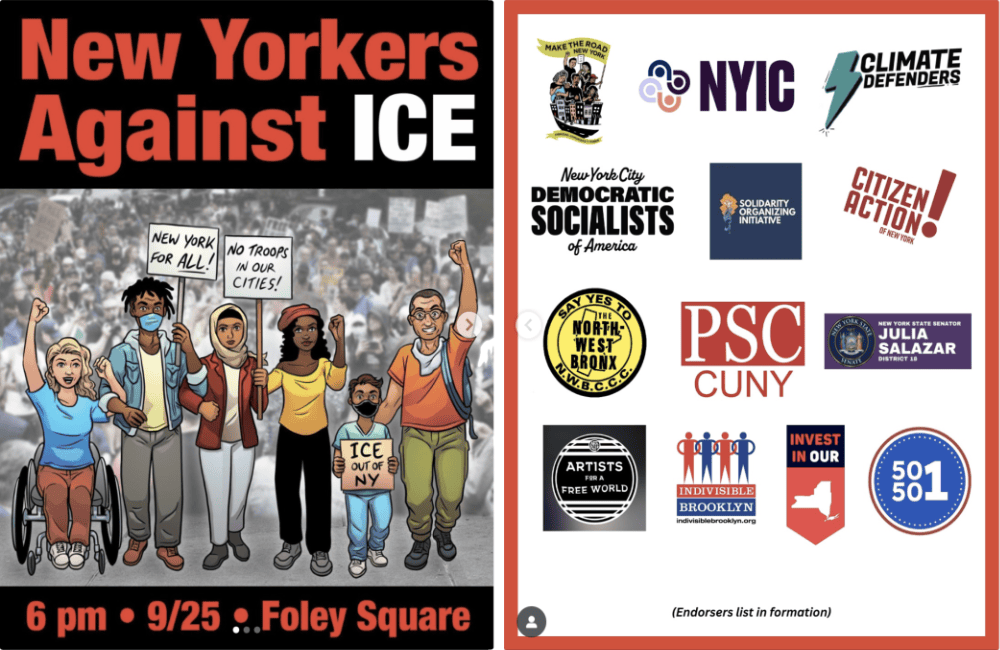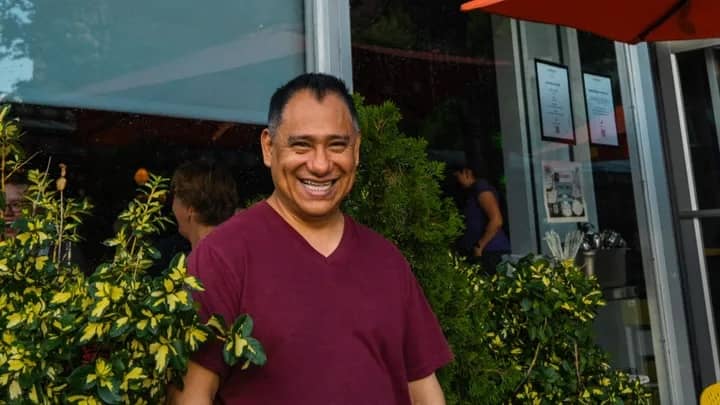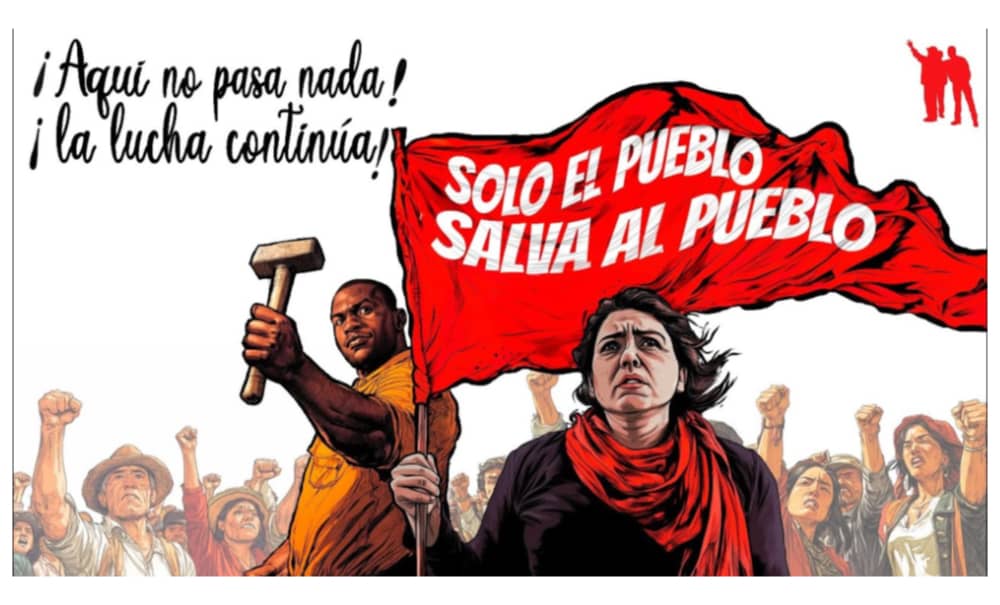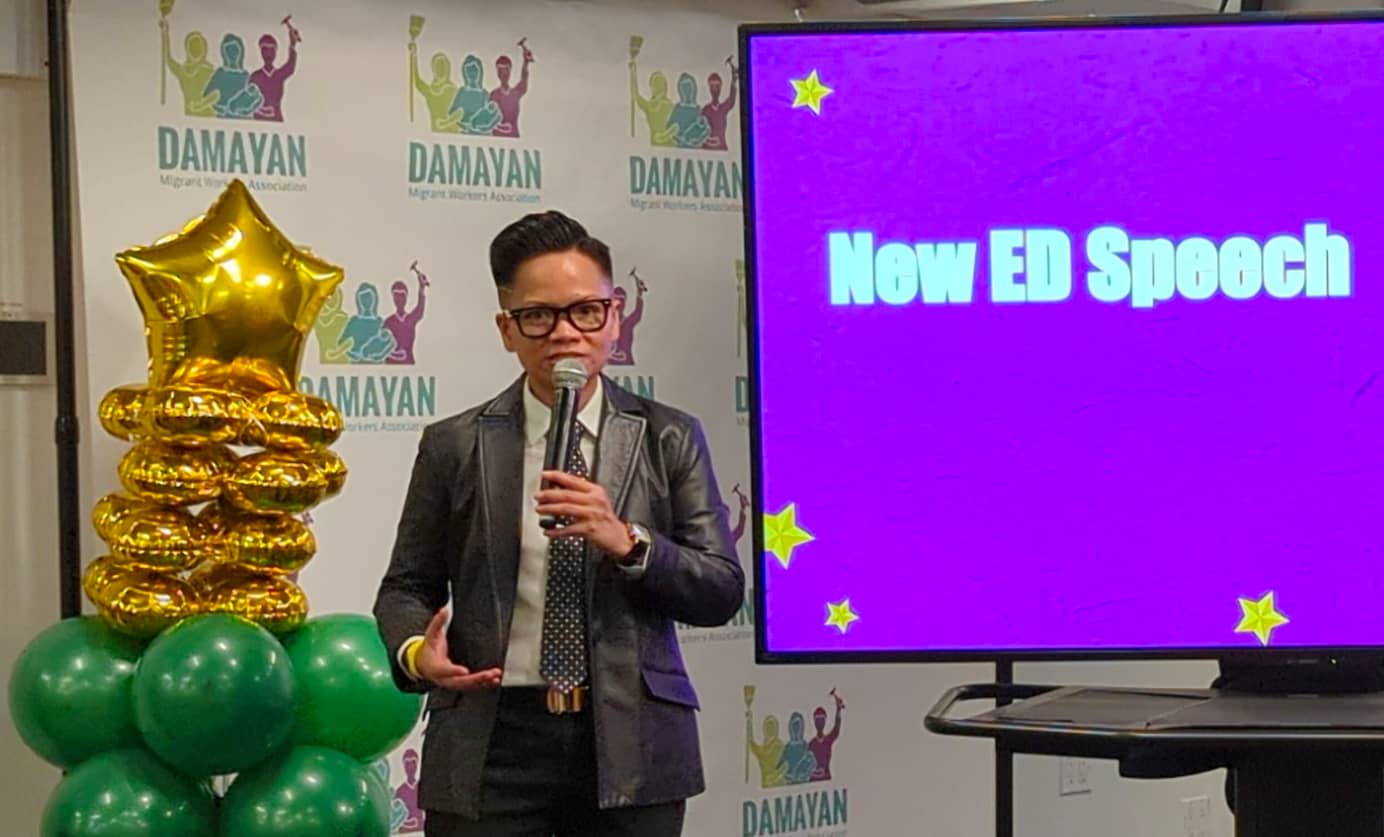
Dear friends,
In just the past few days, news that can knock you over has reached our door. JHISN learned that ICE snatched a well-known and beloved waiter in Jackson Heights on September 3. According to the GoFundMe campaign for Dino, he was “chained hand-to-feet, and taken by bus and plane to several prisons and detention centers, always chained up, going for days without any food, from New York to New Jersey to Texas, until he was finally left with the Mexican immigration officials at the border.” His situation is similar to tens of thousands of US immigrants attacked by the Trump regime, but recognizing his face and benefiting directly from his labor makes his inhumane incarceration and deportation a shock and a wake-up call. It can happen here. It is happening here.
 Dino, outside the Queensboro restaurant where he worked in Jackson Heights.
Dino, outside the Queensboro restaurant where he worked in Jackson Heights.
Our newsletter, in keeping with these grim times, reports on the federal government’s unprecedented attack on immigrant children, including the arrest of students and young neighbors here in Queens. And we offer a wide-ranging political analysis of the current deportation machine, accompanied by a locally-focused survey for our readers about what you hope to do as ICE violence against immigrants closes in.
Newsletter highlights:
- Immigrant children detained and caged
- Resisting ICE is crucial – how will Jackson Heights resist?
1. ICE Wages War on Immigrant Children
This is a really tough year for young immigrants in the US.
“We now regularly hear reports from members whose friends and classmates have disappeared after routine court appearances, and our members are afraid to go to court, school, and even leave their homes out of fear they will be detained by ICE. No child should have to choose between their safety and their right to due process.”–Beth Baltimore, deputy director of The Door’s Legal Services Center
The dramatic spectacle of the Trump regime attempting to deport, in the dead of night over Labor Day weekend, 76 Guatemalan children who had come to the US alone and were living in shelters or with foster care families, only intensified fears for immigrant children across the US. Lawsuits were immediately filed and the removals were temporarily stopped. Missing from many news reports was the fact that in July Guatemalan government representatives toured US detention facilities.To avoid the possibility that any detained Guatemalan children who turned 18 would be sent to adult detention centers, the Guatemalan government said they would accept “all unaccompanied minors, who wanted to return to Guatemala voluntarily.” On September 10 in federal court the Department of Justice abandoned its claim that either Guatemalan parents or children had requested to be reunited and stated it actually had no evidence for that allegation. On September 18, a federal judge blocked the children’s removal for the foreseeable future. But the incident shines light on the plight of immigrant children now in the crosshairs of a deportation machine running wild.
Although Trump’s deportation plan claims to focus on “the worst of the worst,” it seems more like an assembly line plan of “last in, first out.” Those who entered the US without papers in the last 2 years are most likely to face expedited removal. Not only are they detained, they are also shunted around to as many as four different detention facilities before either being deported or released to face further immigration hearings.
Back in May 2023, the Biden Administration expanded the digital CBP One app to allow immigrants to make appointments for asylum hearings before entering the country. People could stay for 2 years and work legally. However, Trump cancelled the program in January 2025 and invalidated 30,000 appointments. All entries using CBP One became grounds for removal. Now when people who used the app show up in court for legally arranged required hearings, ICE agents waiting outside courtrooms snatch them immediately, even if they have received new court dates.
Several minors in New York city and state have been caught in this process: 50 children younger than 18 have been detained by ICE at their legally required check-ins and 38 have been deported. Also, some New York high school students have been detained. Here are details of some cases.
In May, Dylan Lopez Contreras, a 20-year-old student at ELLIS Prep, was the first public school student detained by ICE at his scheduled hearing. He arrived from Venezuela in 2024 and had permission to live and work here through Biden’s CBP One program while he went through the asylum application process. On June 16, a federal judge reinstated Dylan’s pending asylum case and pursuit of protections under the Special Juvenile Immigration Status (SIJS). Dylan spent two months in ICE detention. He’s represented by New York Legal Assistance Group.
On June 4, Derlis Snaider Chusin Toaquiza, a 19-year-old 11th grader at Grover Cleveland High School, was the second known New York City public school student apprehended by ICE. He and his family arrived from Ecuador in March 2024 and applied for asylum. Derlis was detained for a month in Texas and finally released on July 18 so he can return to school and continue his asylum case.
In June, Joselyn Chipantiza-Sisalema, a 20-year-old high school student, was arrested. She arrived from Ecuador in May 2024. According to her attorneys, at her June asylum hearing, the immigration judge had set a court date for March 2026. But she was arrested by ICE officers outside the courtroom anyway and sent to Louisiana. She was released in July after Make the Road New York sued on her behalf.
Also in June, Oliver Mata Velazquez, a 19-year-old asylum seeker from Venezuela living in Buffalo was unlawfully arrested by ICE agents while attending a mandated court hearing and then fast-tracked for deportation. Oliver had legal entry in September 2024 via CBP One, has no criminal history, and complied with all government orders when applying for US citizenship. He was released in August and able to reunite with his family and community as his asylum case proceeded after US District Judge Lawrence Vilardo ordered ICE to release him, saying,
“Mata Velasquez followed all the rules. On the other hand, the government changed the rules by fiat, applied them retroactively, and pulled the rug out from under Mata Velasquez and many like him who tried to do things the right way.”
New York Civil Liberties Union, African Communities Together, and The Door are hoping Judge Vilardo’s decision will help others kidnapped by ICE. “These policies are unlawful,” the lawsuit argues. “Such arrests chill access to the courts and impede the fair administration of justice.” An initial hearing is scheduled for October 10.
In August, Martha, a Jackson Heights mother with four children (two daughters 6 and 16, two sons 19 and 21), took her 6-year-old and 19-year-old to their required immigration hearing and all three were detained. Martha and two children arrived from Ecuador in December 2022. Their application for asylum was denied, and an attempt to appeal failed because paperwork was filed too late. Martha and the 6-year-old were deported to Ecuador; 19-year-old Manuel is in detention in New Jersey.
On August 9, Roger Iza, a 15-year-old Manhattan high school student, and his father, Edison Iza, who arrived in 2023 from Ecuador, had their asylum application denied. They had filed without an attorney. Roger was enrolled in school, but they were arrested by ICE at a required check-in in New York. After being transported to a series of out-of-state hotels, where they had no access to phones or the internet, they were deported to Ecuador on August 14.
On August 4, Mamadou Mouctar Diallo, a 20-year-old Brooklyn student from Guinea, was detained at his hearing at 26 Federal Plaza. He’s the third NY city high school student to be detained at a required hearing. He arrived in January 2024. Before he was arrested, he had been released by the Biden administration, enrolled in high school, completed a training program to become a security guard, joined the Audubon Society and enrolled in a culinary internship. His teachers and NY City Schools Chancellor Melissa Aviles-Ramos have expressed support for him.
No arrests have yet been made inside NY City schools, and principals and teachers are trying to reassure parents and students that it’s safe to attend classes. But many students are afraid to go to school. In addition, immigrants who are victims of crimes or abuse are afraid to contact police and/or appear in court as witnesses and many others are afraid to get necessary medical care.
WHAT CAN WE DO?
- Attend the New Yorkers Against ICE demonstration on September 25.
2. Resisting the Deportation Tsunami–Invitation to Our Reader Survey
Multiple legal cases have tried to slow down the Trump regime’s trampling of long-standing asylum laws and the supposedly sacred Constitution. Court decisions have gone back and forth, but the trend is clear: they can’t be counted on for relief. In May, a Massachusetts District Court ruled that immigrants must be offered asylum hearings, and must have 15 days to contest a threat of deportation to a third country. But in June, a Supreme Court order put that ruling on hold, allowing third country deportations to continue. In July, a federal judge ruled that ICE must stop racially profiling Latinos for indiscriminate arrests. In September, an “emergency intervention” from Supreme Court “justices” overturned that injunction. This month, a California federal judge ordered that Temporary Protected Status for Venezuelans and Haitians must be restored immediately—but the administration stalled and refused to comply, causing widespread panic. Now the Ninth Circuit Court has recently ruled that the regime can and in fact already has terminated TPS for our Nepalis, along with Hondurans and Nicaraguans. Lawsuits by the National TPS Coalition and the ACLU attempting to restore TPS are ongoing.
Despite the lack of a united, strategic Left and progressive movement nationwide, angry people in many localities are resisting. In particular, there is a spreading neighborhood-based movement against ICE and mass deportation. In Rochester, more than 200 local residents showed up to disrupt an immigration raid causing ICE agents to flee the neighborhood with four slashed tires. Worcester residents surrounded ICE agents and delayed their arrest of an immigrant mother. In Nashville, an ICE arrest was prevented by angry neighbors. There are many other examples of community intervention: in San Diego, Minneapolis. San Francisco, Huntington Park, Waltham, Los Angeles and many other places.
JHISN has been talking among ourselves about the likely arrival of large-scale ICE attacks in our neighborhoods in the near future, and how to respond. We don’t think we can rely on the midterm elections, or wait and hope that Trumpian fascism will fall apart on its own. Legal and legislative attempts at the national, state and city levels to try to rein in ICE are important, but not sufficient. JHISN believes there has to be a local response by local residents, showing our opposition and outrage at attacks on immigrants, and countering ICE’s secret police outrages. We must do our best to make ICE a pariah.
We consider our 550 newsletter subscribers to be an informal local network of people in solidarity with immigrants. What role can we play in resisting ICE? Would you like to be informed when ICE shows up on our streets? Would you be interested in reporting ICE’s presence to the whole neighborhood? Would you be part of a rapid response network to protest and defend immigrant neighbors threatened with deportation? We’d very much like to hear your thoughts…to share information with us, please complete our short survey.
WHAT CAN WE DO?
- Complete the JHISN survey and add your thoughts to our community’s insight on resisting ICE actions in our neighborhood.
In solidarity and with collective care,
Jackson Heights Immigrant Solidarity Network (JHISN)
Follow @JHSolidarity on Facebook and Twitter and share this newsletter with friends, families, neighbors, networks, and colleagues so they can subscribe and receive news from JHISN.


